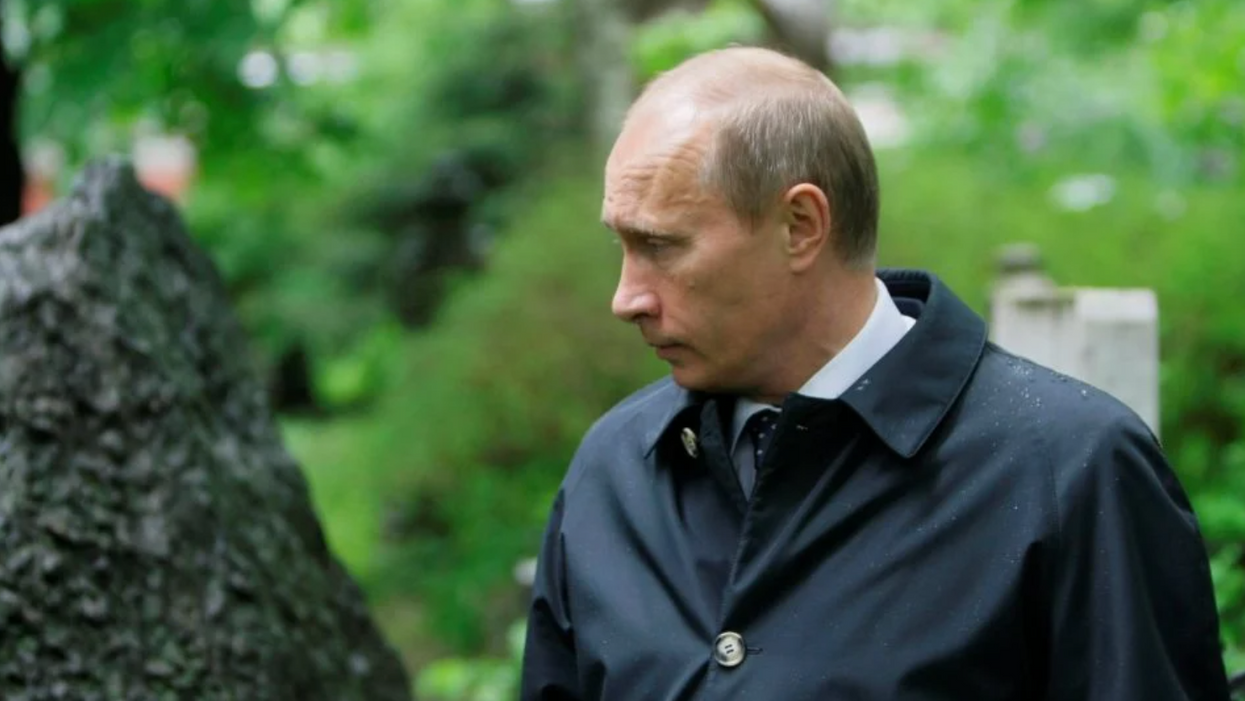Vladimir Putin Should 'Denazify' Himself
When Russian President Vladimir Putin said that the reason for his bloody invasion of Ukraine was to purge it of "drug addicts and neo-Nazis," the Russian dictator provoked sneers and laughter. It was a ludicrous claim against a nation that had elected a Jewish president, who lost family members to the Holocaust, with 75 percent of the vote in 2019. The far-right party, by the way, won 1.6 percent in that election.
Putin's rationale to "de-Nazify" Ukraine by the barbaric leveling of its cities and mass murder is an exercise not only in war crimes, but in political projection. It is an absurdity of a kind that is practiced by his slavish American collaborator, former President Donald Trump — the loser who accuses opponents of stealing the election that he actually tried to steal.
Putin's "Nazism" ploy is of course a cynical and cliched propaganda trope, playing on the Russian people's epochal struggle against Adolf Hitler's Germany. It is persuasive to them only because no honest narrative is permitted on Russia's airwaves or in its press, which are forbidden to report the facts of the invasion under penalty of imprisonment. It is also a crime in Russia to report that the Putin regime is the polestar of neo-fascism and neo-Nazism in the world today.
It is no accident, as the old Marxist cliche goes, that the most enthusiastic supporters of Putinism in this country are our very own homegrown fascists — not just Trump himself, but the entire ideological apparatus surrounding him, from Steve Bannon and Alex Jones to the self-styled America First Political Action Committee, whose neo-Nazi leader Nick Fuentes led a chant of "Putin! Putin!" at their annual meeting last week. (Noting that commentators had compared Putin to Hitler, he asked with a smirk, "Is that a bad thing?")
Indeed, the Kremlin's covert actions to elect Trump align perfectly with Putin's role in Western politics seeking to exalt neo-fascist movements. Seeking to leverage the extreme right, the Russian state and its proxies have provided covert support and funding to anti-democratic movements both here and across Europe — and have seen those efforts exposed repeatedly.
The most explosive and embarrassing incident, at least until the U.S. presidential election in 2016, occurred in France. By 2014, the National Front, led by Marine Le Pen, seemed poised to gain power in the final round of French elections. But as a fascist party founded by Le Pen's father, a notorious neo-Nazi and Holocaust denier, her outfit faced financial difficulties. A Russian bank linked to the Kremlin and its intelligence services stepped in with a loan of nine million Euros, thus enabling Le Pen to promote her party's anti-NATO and anti-European policies, if not to actually win election.
Tracing Putin's foreign initiatives and his attempts to influence elections in other countries is to chart the rise of neo-fascism. In Greece, the Russians have patronized and siphoned money to Golden Dawn, an unabashedly pro-Nazi organization that routinely engages in violence and whose leaders were convicted of murder two years ago. In Austria, Russia's principal political ally is the Nazi-inflected "Freedom Party." And in Germany, the Kremlin promotes the AfD, or Alternative for Germany, ideological heir to Hitler's National Socialists — and funnels in the Russian money.
The same pattern holds true across Eastern Europe; in Hungary, for instance, the Jobbik Party, an anti-Semitic movement with roots among that country's Nazi collaborators, is assiduously Putin-backed, as is Ataka, the neo-Nazi party of Bulgaria. In Ukraine, Putin tried to maintain a puppet regime. The independent Ukraine President Viktor Yushchenko was poisoned in 2004 and nearly died in a pattern eerily similar to other Russian poisonings and assassinations. Then Putin's puppet, Viktor Yanukovych, was overthrown in 2014 by a mass uprising. Putin has been desperate for revenge ever since.
There is a background of pro-Nazi history in Ukraine, dating back to World War II, when the Organization of Ukrainian Nationalists joined forces with Germany against the Allies and committed atrocities against Jews, Poles and, yes, Russians. But unlike Germany, Greece, France, and many other countries where populist and fascist parties have risen in recent years, that element in Ukraine barely reached two percent in the election when Volodomyr Zelensky won the presidency. Putin, the neo-Nazi sugar daddy, is playing on that discredited past and trying to tie it like a noose around the Jewish liberal leader.
What these rancid movements and parties share, along with Trump and his minions here, is an eager willingness to advance Putin's aggressive authoritarian ambitions, whether in Ukraine or elsewhere. All of them, including Trump, are hostile to NATO and the European Union, which they rightly regard as bulwarks of democracy and liberalism. All of them promote a reactionary version of "Christianity" that is violently antagonistic toward religious minorities, gay people, women's equality, and social liberalism.
As for Putin himself, what does he believe? Like his bedmate Trump, the Kremlin autocrat is more of a syndicate boss, the leader of a Mafia. He only expresses beliefs that ruthlessly serve his will to power — and to the extent that he articulates any ideology, it is a toxic mash of centralized authority, angry nationalism, furious hatred for the West, and a mystical idolatry of the "Russian spirit." But he revealed what that all means to him back in 2005, when he arranged for the reinterment of the remains of the Russian fascist philosopher Ivan Ilyin at a Moscow monastery. Yes, that is Putin's true philosophy, and he made it plain himself: fascism.
Putin must be treated with a mixture of resolution and caution, but nobody should have the slightest illusion about who and what he really is — and why he is committing war crimes hour by hour.
To find out more about Joe Conason and read features by other Creators Syndicate writers and cartoonists, visit the Creators Syndicate website at www.creators.com.


